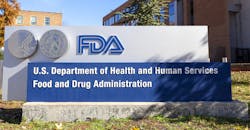Opinion
Much has been written and said about the ongoing shortage of baby formula. It is a supply-chain challenge exacerbated by market concentration, lack of competition and restrictions to foreign entry. The safety issue that caused the shortage, however, is far more alarming and raises concerns about other food products regulated by the Food and Drug Administration.
Baby formula is one of the most strictly regulated food products, given the vulnerable population that consumes it. According to the FDA, all formulas marketed in the United States must meet federal nutrient requirements, and manufacturers must notify the FDA before marketing a new formula. However, at least four infants have died since early 2021 after consuming formula manufactured by an Abbott Nutrition plant in Michigan, and five additional deaths are being investigated but have not been directly linked to the plant.
This is an American tragedy, one that was fully avoidable if only Abbott had prioritized consumer safety and if only the FDA had met the bare minimum that consumers expect by performing regular safety inspections and responding to whistleblower complaints.
Even in nations where government accountability is not a strong suit, a crisis of this magnitude would trigger a different response. Consider the 2008 Chinese infant formula scandal, in which six babies died after consuming contaminated formula made by Sanlu Group, China’s largest baby formula maker at that time, with a nearly 20% market share. Following the criminal convictions of several senior executives and the dismissal of eight national and local officials, the company declared bankruptcy and has never recovered.
Unfortunately, no one has taken responsibility for the ongoing baby formula crisis in the United States. Abbott has denied any wrongdoing and portrayed itself as a hero for saving babies from a critical shortage. The only person fired was the whistleblower, who reportedly tried to raise these issues from within, was fired and subsequently reported the safety concerns to the FDA.
Clearly, the food safety system failed. The federal government was notified of potential problems at this plant in February 2021. It took a year and many other trigger events for this issue to reach the level of attention of the food safety agency, even for this very high-risk food.
The FDA claims to use a risk-based approach to inform its inspectional priorities; the result calls into question how the agency is defining risk. Even though the plant produces about 20% of the baby formula sold on the market, the FDA did not launch an investigation into the Michigan plant for months after receiving a whistleblower complaint about its dangerous manufacturing practices, which is inconceivable for such a high-risk food. At the same time, American parents were kept in the dark during that year, only to learn later that nine infants may have died as a result of poor manufacturing practices and a lack of oversight.
This is not the only challenge facing the FDA's food system, and much work remains to be done before the agency is operating effectively. But where to start?
One straightforward approach that would be relatively low-cost to implement would entail better communication with consumers about risk. Take, for example, vaccinations. Currently, the Department of Health and Human Services (HHS) relies on the Vaccine Adverse Event Reporting System (VAERS) to share information about adverse events that occur after vaccinations. Although the data is difficult to read and analyze for the general public, its availability means that others, such as OpenVAERS, can use it to disseminate the data in more accessible forms.
Unfortunately, the same cannot be said for baby formula, which serves as the sole source of nutrition for some of America's most vulnerable citizens, or other foods. The information on consumer complaints was obtained only through a Freedom of Information Act (FOIA) request. This is public information within a publicly funded agency. Consumers have a right to this information, but it is only available through burdensome and time-consuming FOIA requests.
The nine infants were not the only victims of the baby formula crisis. As early as 2019, the FDA was made aware of multiple complaints to the company about infants becoming ill after consuming formula produced by the Michigan plant. In many cases, pediatricians complained to the FDA about their patients’ becoming ill or being hospitalized after consuming Abbott baby formula. Despite this, such information was never made public until recently. The FDA should make such information available to the public in the same way that the HHS makes post-vaccination adverse events available.
The ongoing baby formula shortage, like any other product shortage, will quickly fade from the collective memory of the American public. However, unless the FDA makes fundamental changes to its food program, the underlying safety flaw will haunt us for years to come. Unfortunately, based on recent food safety experiences, the FDA’s pace of organizational change is likely to fall short of the critical need to reform how food safety is regulated. Given this, the FDA should at the very least ensure that consumers have access to potential warning signs of problems with the food products that it regulates.
Tinglong Dai is a professor of operations management and business analytics at Johns Hopkins University’s Carey Business School and a core faculty member of the Hopkins Business of Health Initiative. Kara Morgan is principal at Quant Policy Strategies and is chair of the INFORMS Advocacy and Governance Committee. She is also a former senior member of the FDA.
About the Author

Tinglong Dai
Professor of Operations Management and Business Analytics, Johns Hopkins University
Tinglong Dai is a professor of operations management and business analytics at Johns Hopkins University’s Carey Business School and a core faculty member of the Hopkins Business of Health Initiative.
His research focuses on the healthcare ecosystem through the lens of analytics, eliciting novel insights into behavior, incentive, and policy issues and contributing to the burgeoning field of healthcare operations management (HOM) 2.0. He has also been working on global supply chains, marketing-operations interfaces, and human-AI interaction.
His most recent writings and media appearances have focused on global supply chain issues (esp. vaccine rollouts, testing, and PPE) arising from the COVID-19 pandemic, the war in Ukraine, and the ESG movement. He has appeared in national and international TV such as CNBC, PBS NewsHour, and Sky News, and have been featured in ABC News, The Associated Press, Baltimore Sun, Barron’s, Bloomberg, Business Insider, CBC, CBS News, Chicago Tribune, CNN, The Conversation, Fast Company, Financial Times, Fortune, Globe and Mail, Harvard Business Review, The Hill, KHN, Les Echos, MarketWatch, MedPage Today, Modern Healthcare, Nikkei, New York Times, Newsweek, NPR, Quartz, Slate, STAT, U.S. News & World Report, USA Today, Wall Street Journal, Washington Post, and Wired, among other media outlets.
His work has appeared in a variety of prestigious journals, including Management Science, Manufacturing & Service Operations Management, Marketing Science, and Operations Research. He serves as an associate editor for Management Science, Manufacturing & Service Operations Management, Naval Research Logistics, and Health Care Management Science, and as a senior editor forProduction and Operations Management. He co-edited the Handbook of Healthcare Analytics: Theoretical Minimum for Conducting 21st Century Research on Healthcare Operations, which was published by John Wiley & Sons in 2018.
Since 2016, he has been organizing the Johns Hopkins Symposium on Healthcare Operations, an effort to bring together leading clinicians, health scholars, and policymakers.
At Johns Hopkins, he has been teaching two required core courses — Operations Management and Artificial Intelligence — and one elective course on Contracting: Incentive Design and Analytics, all at the MBA level. Prior to joining Johns Hopkins in 2013, he earned a PhD (2013) and an MSIA (2009) in Operations Management and Robotics from Carnegie Mellon University’s Tepper School of Business and Robotics Institute. He also earned an MPhil from Department of Industrial Engineering and Decision Analytics of Hong Kong University of Science and Technology in 2006.
